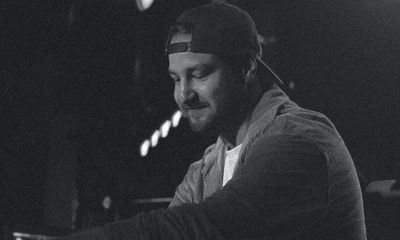dig dis!cover: Sascha Kloeber
Today we have Sascha Kloeber as our guest. We will talk about his life as a ghost producer and the difficulties he had to face in his career, plus why founding his own label "Funkelt" was the right decision.
What inspired you to become a DJ and to make music?
I'm actually not a DJ. I've always been doing music production since I was a teenager and have had a few DJ gigs, but that was more of an exception. There was also a phase where I played live, but I focused more on music production. And how it came to making music in the beginning - I can't remember at all. Somehow it was always there. *laughs*
Why electronic music specifically?
I used to play in bands and stuff, but I've always been fascinated by electronic music because it gives you so many ways to express yourself creatively without necessarily having to arrange with others. I also kind of grew up with techno which was always present in a way.
What does your creative process look like? What mustn’t be missing when you make new music?
I try to do it rather the other way around: Since I've been producing music for many years I always try to do new things and to not follow old habits. It is important to me that my music always has a variation and that I always start completely from scratch. Additionally, my music should stand out and remain multifaceted. In other words, it should contain some kind of signature that distinguishes it from other music that is out there.
I have built a studio at home where I can work and produce music. Having my equipment at the ready and being able to produce anytime I want is very important for me. I often have spontaneous ideas that I want to try out immediately. For me, producing music is also not like a nine to five working day. I rather plan my life around producing than the other way around. If I can't sleep at night, it often happens that I continue to make music for a few hours, which is why it is important to me that my equipment is close by.
What is the process like when it comes to ghost productions? Do the artists contact you and tell you what they want or how exactly is the workflow?
In the beginning I was contacted by artists who were familiar with the music I released under my name. Most of the time they liked my sound but didn't have the knowledge or the time to produce music themselves or they just didn't manage to do it that well.
At some point, the whole thing got around and more artists reached out to me who didn't know my music at all, except from fellow artists.
In the beginning I underestimated ghost productions, because it is not so easy to give away tracks that mean something to you. Once the first track goes through the roof and achieves a lot of success, it's hard not to tell anyone about it. Often you don't get anything out of the streams and downloads for a song, because you already got an advance payment and that’s it.
I know ghost producers who have no problems with it at all, but sometimes I just find it hard to give tracks away.
How did it go from there?
At my peak times I had two orders per day or maybe even more. Sometimes there were so many requests that I couldn't accept them anymore. At some point, producing music became more and more a chore and like monotonous assembly line work.Ironically, the music has more success this way. Perhaps because this music sounds more common and simple.
It's important to me to open up about the topic of ghost productions, just because there are so many artists using them in today's music industry.
What is the difference between a commissioned work and making music that you will release under your own name?
The biggest difference for me is that when I make music for myself I can do anything I want. You end up being in control of the whole process, from start to finish. With commissioned work, it's often about the idea of what's currently trendy. The ghost producer only serves the client who wants to gain success and fame. It doesn't matter whether the idea behind it is good or how fancy the sounds are etc. - what’s important is that all requirements were fulfilled.
As a musician, that's not what I want. For me, the music itself comes first and I try to avoid all economic reasons when I produce music as much as I can.

Let's move on to the topic of social media: what importance does it have for your music and what does the interaction on Instagram or Facebook with your fans mean to you?
I can imagine that I could achieve a greater reach with my music if I wouldn’t be struggling that much with social media. The social media world is a bit of a burden for me. I've gotten into the habit of only posting things when I have something to say. Everyone advised me to post a lot regularly and continuously, but it didn't feel good to me.
Nowadays you can't really tell who is listening to your music, maybe you can find out the country group or age group through store analytics but it's all become more anonymous. I think SoundCloud is great because the interaction is direct. People can comment directly the moment they hear the music. And for me, that's the most honest feedback you can get outside of a club or real life events.
Don’t get me wrong, I like to interact with others on social media, but it's also something that distracts me from making music which is just more important for me.
Your label "Funkelt" is distributed by dig dis!. What’s the story behind the new label?
One of the main reasons why I have found my own label was that it took me too long to publish my releases on other labels. Sometimes it happened that I produced some stuff but the label released it more than a year later. Meanwhile I also think that it makes more sense to have your own label. I have also released on major labels, but in the end I was surprised that the actual reach of my releases were not as big as I had hoped.. They had countless followers, but had so many releases that in the end the part of the cake was not bigger than if you had your own (small) label.
The pandemic has now slowly a foreseeable end (hopefully!) and also the first clubs are open again. What else can we see from you this year?
I will continue with producing music as before. I don't want to release so many different things under my name anymore, but concentrate on techno and melodic techno. Furthermore I will work on a commercial project and maybe reactivate some old artist projects like Sakloe.
Thanks for the nice interview Sascha Kloeber and thanks for your insight into the music world!
If you are interested in giving us a look into your music business, don't hesitate to let us know.



